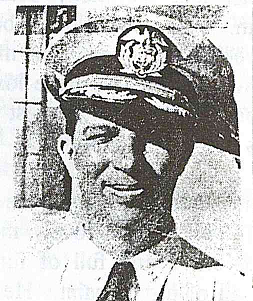
Rudy Patzert in 1946
Rudolf Ward Patzert was born in New York City in 1911; his family subsequently moved to Florida. In 1928, at the age of 17, he read that Admiral Richard E. Byrd was planning to take several Eagle Scouts with him on an expedition to Antarctica. Rudy mailed his Eagle Scout badge to the admiral, but it was returned to him with the explanation that he had all the cabin boys he could use.
During World War II, Rudy served in the Merchant Marines, commanding a succession of the supply ships that helped form a steel bridge across the Atlantic. When the war ended he was approached by representatives of the Haganah, the militia of the Jews of Palestine, to serve as captain of the “Paducah,” a 900-ton gunboat. During both world wars, the “Paducah” had cruised the Atlantic coast on submarine watch and was eventually decommissioned. It was surreptitiously purchased by the Haganah and was to sail under the flag of Panama.
Officially, Captain Patzert’s assignment would be to take the ship to Europe, but he acknowledged in a memoir that he knew the ship would be used to transport European survivors of the Holocaust past a British blockade into Palestine.
Since World War I, the British government had overseen Palestine. In 1917 it issued the Balfour Declaration, committing Britain to the establishment of a Jewish homeland in Palestine. But as Jewish immigration into Palestine increased, and Palestinian Arabs began to press their opposition to it, Britain sharply limited the number of Jews entering the region.
The “Paducah,” staffed by American and Canadian volunteers, was one of 10 American vessels purchased by the Haganah. The ships were to deliver about 30,000 refugees to Palestine. As related in his memoir, “Running the Palestine Blockade: The Last Voyage of the “Paducah” (Naval Institute Press, 1944), Captain Patzert’s voyage proved more hazardous than most. He had safely moved his ship carrying 1,380 refugees from Bulgaria to within seven miles of the port city of Haifa, when it was intercepted by a British destroyer. The British ordered him to surrender. “If you resist, the blood will be on your head,” the British captain announced through a megaphone. “You are now entering territorial waters and you are liable to arrest if you continue.”
Captain Patzert instructed the helmsman to swing the “Paducah’s” bow until its course lay parallel to the shore. But another destroyer bore down on the ship. Captain Patzert and his passengers could see a boarding party forming on the deck of the destroyer. The sailors were wearing helmets and gas masks and carried rifles and clubs. The captain stopped the ship’s engine. The second British destroyer rammed the “Paducah,” and the British sailors leaped onto its deck.
“Using their clubs as flails, they knocked down several of the men and boys standing there,” Captain Patzert wrote. “From the deck of the destroyer, a young sailor turned a hose on us. I was ready to brace myself against a stream of high-pressure water, but something else hit me – tear gas.
“I grabbed my throat and eyes,” he continued. “A woman alongside me threw her shawl over her child’s head, hugging him to her, the tears flowing down her contorted face. A soldier with a Sten gen, his face hidden in a grotesque gas mask, strode down the deck.”
After the British captured the “Paducah,” the ship was rerouted to Cyprus and Captain Patzert, his crew and all the passengers were interned in tents and Quonset huts. They were to remain there for two years.
The British also held captured German soldiers there. “The German POWs had better accommodations,” Captain Patzert told his wife. He added that his time in British captivity was “the hardest two years of my life.”
Eventually the “Paducah’s” passengers made their way to Israel, and Captain Patzert returned to his home in the United States.

